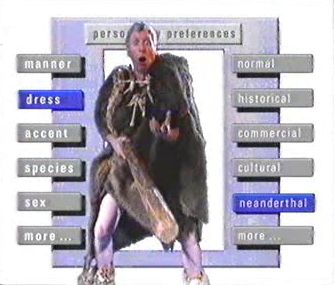You are here
| Size | Seeds | Peers | Completed |
|---|---|---|---|
| 252.53 MiB | 1 | 0 | 338 |

![]()
Hyperland is a 50-minute-long documentary film about hypertext and surrounding technologies. It was written by Douglas Adams and produced and directed by Max Whitby[2] for BBC Two in 1990. It stars Douglas Adams as a computer user and Tom Baker, with whom Adams had already worked on Doctor Who, as a personification of a software agent.
more here:
https://en.wikipedia.org/wiki/Hyperland
-----
32 years later, Hyperland serves as a reminder of what the internet can be, which gives us a bit of a clue as to where it's gone wrong.
What I noticed, is that the "Intelligent Agents" that Douglas Adams imagines, work for us, the users. Whereas most of what we see on the internet today, and even the software on our own devices, works for corporations. This seems to me to be a core problem, which perhaps Open Source software will some day solve.
- Log in to post comments

Comments
Thanks for sharing this! It
Thanks for sharing this! It has true archival quality, and does indeed showcase our exuberant optimism in the 90s.
Technologies tend to become monetized and manipulable (even the telephone and the radio went that route), so I cannot agree with your final point above about Open Source (but nice idea...)
Douglas Rushkoff outlines a different class of "tendencies" that technologies inhere towards, especially a tendency to promote one set of behaviors over another. Rushkoff goes through ten commands that he claims represent one of these tendencies or biases of digital media.
What is a bias? He gives the following examples:
The biases he draws out from digital technology are:
On the surface, those seem like very good starting points to discuss any unintended consequence of digital technologies.
1. TIME: Do not always be on
2. PLACE: Live in person
3. CHOICE: You May Always Choose None of the Above
4. COMPLEXITY: You Are Never Completely Right
5. SCALE: One Size Does Not Fit All
6. IDENTITY: Be Yourself
7. SOCIAL: Do Not Sell Your Friends
8. FACT: Tell the Truth
9. OPENNESS: Share, Don’t Steal
10. PURPOSE: Program or Be Programmed
This is amazing, thank you.
Very interesting and didn't know much about Douglas Rushkoff.
Trivia
I haven't seen this but reading the text, I thought of Hypercard, Apple's consumer friendly programming package and wondered how that may have influenced this as Douglas Adams bought the first two Apple Macs to arrive in the UK in 1984 - the third was bought by Stephen Fry.
[edit - it was actually the first two Macs to arrive in Europe]